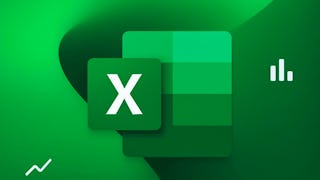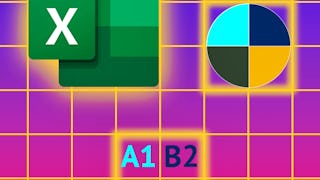"Everyday Excel, Part 1" is aimed at learners who are seeking to learn Excel from the ground up. No experience with Excel is necessary. While this course is meant for beginners of Excel, advanced users will undoubtedly pick up new skills and tools.

Gain next-level skills with Coursera Plus for $199 (regularly $399). Save now.

Everyday Excel, Part 1
This course is part of Everyday Excel Specialization

Instructor: Charlie Nuttelman
295,247 already enrolled
Included with
(3,655 reviews)
Recommended experience
What you'll learn
Navigating Excel, editing the worksheet (including inserting/deleting cells, columns, and rows), and cell formatting.
Expression entry and common Excel formulas (including logical functions, text functions, and financial functions).
Data management (sorting, filtering, consolidating, removing duplicates, data validation, and one-way lookups).
Data visualization (scatter plots, column charts, pie charts, Slicers, Sparklines, and Pivot Tables).
Skills you'll gain
Details to know

Add to your LinkedIn profile
6 assignments
See how employees at top companies are mastering in-demand skills

Build your subject-matter expertise
- Learn new concepts from industry experts
- Gain a foundational understanding of a subject or tool
- Develop job-relevant skills with hands-on projects
- Earn a shareable career certificate

There are 6 modules in this course
In Week 1 you will learn the fundamentals of working in Excel. You’ll begin by navigating Excel, opening and saving files, and understanding how workbooks and worksheets are structured. You’ll then explore how cells, rows, and columns work together, how to move efficiently around a worksheet, and how to enter and edit data. You’ll also learn how to format cells, apply conditional formatting, and use common number formats such as text, dates, and currency. Finally, concepts like relative and absolute cell references will be emphasized, as well as naming cells and ranges to make your work more efficient and accurate.
What's included
22 videos1 reading1 assignment2 programming assignments
In Week 2, you will focus on implementing Excel formulas. You’ll learn about the order of operations, how to build mathematical formulas, and how to troubleshoot issues when results aren’t what you expect. You will be introduced to a popular selection of Excel’s built-in functions, including those used for summing, counting, averaging, rounding numbers, calculating remainders, generating random numbers, and performing logical tests.
What's included
18 videos1 assignment2 programming assignments
In Week 3 you will learn how to work with more structured and dynamic data in Excel. You will learn how to create Excel Tables and dynamic named ranges, apply data validation rules, and use advanced conditional formatting techniques.
What's included
13 videos1 assignment2 programming assignments
In Week 4 you will continue building your Excel function skills. You’ll learn how to use more advanced logical functions, including techniques for testing conditions and determining whether values appear in lists. You’ll also explore tools for working with text, including the advantages and limitations of Flash Fill and how to use text functions to clean and reshape data. In addition, you will be introduced to date and time functions and basic financial functions, enabling more complex calculations and data transformations.
What's included
12 videos1 assignment2 programming assignments
In Week 5 you will focus on managing and preparing data for analysis and reporting. You will learn techniques for cleaning data, applying filters, sorting data using multiple criteria, and identifying and removing duplicates. You will also practice consolidating data from multiple worksheets or sources and organize it in a way that supports analysis and reporting.
What's included
12 videos1 assignment2 programming assignments
In Week 6 you will learn how to visualize and share data using Excel. You’ll learn how to create different types of charts, including dynamic charts and Pivot Charts, and enhance visualizations with tools like Slicers and Sparklines. You will also learn how to share Excel content in Word and PowerPoint, print worksheets and charts, and export Excel files as PDF documents.
What's included
17 videos1 assignment
Earn a career certificate
Add this credential to your LinkedIn profile, resume, or CV. Share it on social media and in your performance review.
Instructor

Offered by
Explore more from Design and Product
 Status: Free Trial
Status: Free TrialUniversity of Colorado Boulder
 Status: Free Trial
Status: Free TrialUniversity of Colorado Boulder

Knowledge Accelerators

Packt
Why people choose Coursera for their career




Learner reviews
3,655 reviews
- 5 stars
83.28%
- 4 stars
11.81%
- 3 stars
1.69%
- 2 stars
0.60%
- 1 star
2.59%
Showing 3 of 3655
Reviewed on May 18, 2020
Very much basic course and the instructor described Everything very nicely..Its a must for the beginne.. Had to work hard to go through the course and finally came out to be successful
Reviewed on Nov 16, 2022
I had such a great time learning Excel with Charlie! I have learned so much more about excel and I can use that for my job in Logistic Management Analyst! Thanks for this amazing course.
Reviewed on Apr 3, 2024
I learned much more than I thought I would. Weeks 3-5 were very helpful to my knowledge and skills as well as practical skills I am now using on a daily basis at work. Highly recommend this course.
Frequently asked questions
To access the course materials, assignments and to earn a Certificate, you will need to purchase the Certificate experience when you enroll in a course. You can try a Free Trial instead, or apply for Financial Aid. The course may offer 'Full Course, No Certificate' instead. This option lets you see all course materials, submit required assessments, and get a final grade. This also means that you will not be able to purchase a Certificate experience.
When you enroll in the course, you get access to all of the courses in the Specialization, and you earn a certificate when you complete the work. Your electronic Certificate will be added to your Accomplishments page - from there, you can print your Certificate or add it to your LinkedIn profile.
Yes. In select learning programs, you can apply for financial aid or a scholarship if you can’t afford the enrollment fee. If fin aid or scholarship is available for your learning program selection, you’ll find a link to apply on the description page.
More questions
Financial aid available,





